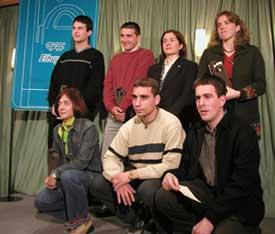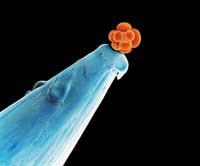1st Prize, 2nd Prize, 3rd Prize and Special Prize
2002/02/01 Carton Virto, Eider - Elhuyar Zientzia | Galarraga Aiestaran, Ana - Elhuyar Zientzia Iturria: Elhuyar aldizkaria
The title of his article is ‘Myth of “therapeutic” cloning: truths and lies’. Why did you choose this topic?
My research topics are always like that. I work in the Chair of Law and Human Genome between the UPV-EHU and the University of Deusto, where we work on issues related to the progress of biomedicine. We write about cloning, transgenesis, etc. I chose cloning for the CAF-Elhuyar awards, because in 2001 it was an important topic.
What is your point of view in the article?
With the article I wanted to claim that therapeutic cloning is a myth. To begin with, it seems to me that this name is totally inappropriate because in giving it one wants to emphasize the therapeutic of cloning, but in reality there is no therapeutic cloning. That is, cloning is a procedure that does not cure anything. The point is that cloning wants a therapy for the future. But, in principle, cloning is not therapeutic.
He said that he belongs to the Chair of Law and Human Genome between the UPV and the University of Deusto. What work do you do in it?
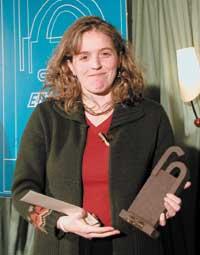
We work on social problems arising from scientific discoveries and technological inventions of the human genome. We try to deepen these issues, create spaces for debate and socialize the fruit of our work. For this, we make publications, have a magazine and teach at the university.
All members of the Chair are law students, but we always try to seek an interdisciplinary dialogue. In our opinion, discoveries and their possible effects on man cannot be monopolized by anyone.
Is it an adequate level of knowledge of society?
I don't know, knowledge is not balanced and it seems to me that we mix a lot. This is the case of therapeutic cloning. Therapeutic cloning has been mixed with stem cell research, they have presented them related, but they are not the same. Stem cells can be obtained by other ways. Part of society knows this, but many do not. The way to give the news, of course, is not random, there is much interest behind the spread of the news.
Learning law, what led to scientific issues?
I always analyze scientific issues from a legal and ethical point of view. I investigate the social impact of advances in science and nature technology. On those issues I saw that law is quite limited, that there was a great challenge, and that is why I was encouraged to investigate in this field of law. And there are few laws made and there is much to do. The novelty and what is to be done called me.
2. Prize: ... and one day the ropes appeared
Why did you choose this topic to make the article?
On the one hand, because it is a current issue and, for example, it is fashionable in the US, because here it has not been heard so much, at least at the same level. That is why I wanted to make known. On the other hand, I have always been interested in physics and I like to know the latest theories.
What is your opinion on today's scientific outreach?
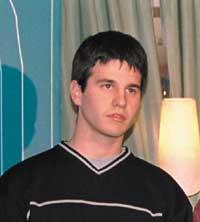
I think in general the situation of scientific disclosure is very good. A lot of work is done on the dissemination of scientific issues and, in any case, sometimes for too high a level, I would appreciate that the information provided is more understandable or more detailed.
On the other hand, although the scientific dissemination in Basque is in its beginnings, I think it is very good. We hear more and more science issues around us, and while there is still much to be done, it seems to me that it is on the right track.
3rd Prize: Overcoming limits by voice
Why did you choose this topic?
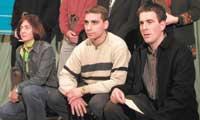
C. L. I. This is an end of career project, presented last month. I have been working for a long time on voice knowledge and upon entering this session we wanted to integrate research areas. One of the lines of research we want to work on is home automation. Also, we wanted to do something for the physically handicapped. Later I met a person who by chance worked with people with physical problems and who wanted to develop a project of this type in Basque to help the physically disabled. And it is that for them today there is nothing in Basque, and I think that if through the voice appliances and other appliances were controlled, they would be greatly facilitated life.
What is your opinion on today's scientific outreach?
C. L. I. Beautiful works are done. I like Zientzia.net very much, I find it very interesting and comfortable. On the other hand, although trials are conducted, it is very difficult to bring science to people. My experience is at least that: my activity is very difficult to explain to simple people in an easy way to understand. However, it seems necessary to me, so we should make more effort.
Special prize: Tumor angiogenesis
Author: Gorka Orive Arroyo
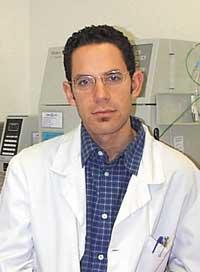
Why did you choose this topic to make the article?
First because it is related to the subject of my doctoral thesis. In addition, from the point of view of scientific disclosure, because cancer and its treatment are topics of great interest.
What is your opinion on today's scientific outreach?
I think that thanks to the current media, scientific disclosure is more widespread than ever. However, most journals are in English and few have been written in Spanish or Basque. For this reason, I would like to highlight that the CAF-Elhuyar awards are important for the scientific dissemination and promotion of Basque.

Gai honi buruzko eduki gehiago
Elhuyarrek garatutako teknologia




